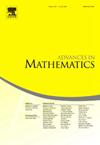An invariance principle for the multi-slice, with applications
IF 1.5
1区 数学
Q1 MATHEMATICS
引用次数: 0
Abstract
Given an alphabet size thought of as a constant, and whose entries sum of up n, the -multi-slice is the set of vectors in which each symbol appears precisely times. We show an invariance principle for low-degree functions over the multi-slice, to functions over the product space in which . This answers a question raised by [23].
As applications of the invariance principle, we show:
- 1.An analogue of the “dictatorship test implies computational hardness” paradigm for problems with perfect completeness, for a certain class of dictatorship tests. Our computational hardness is proved assuming a recent strengthening of the Unique-Games Conjecture, called the Rich 2-to-1 Games Conjecture.Using this analogue, we show that assuming the Rich 2-to-1 Games Conjecture, (a) there is an r-ary CSP for which it is NP-hard to distinguish satisfiable instances of the CSP and instances that are at most satisfiable, and (b) hardness of distinguishing 3-colorable graphs, and graphs that do not contain an independent set of size .
- 2.A reduction of the problem of studying expectations of products of functions on the multi-slice to studying expectations of products of functions on correlated, product spaces. In particular, we are able to deduce analogues of the Gaussian bounds from [42] for the multi-slice.
- 3.In a companion paper, we show further applications of our invariance principle in extremal combinatorics, and more specifically to proving removal lemmas of a wide family of hypergraphs H called ζ-forests, which is a natural extension of the well-studied case of matchings.
多片的不变性原则,带有应用程序
给定一个字母大小m∈N作为常数,并且k→=(k1,…,km),其条目之和为N,则k→-多片是向量x∈[m] N的集合,其中每个符号i∈[m]恰好出现ki次。我们展示了多片上的低次函数的不变性原理,以及乘积空间([m]n,μn)上的函数,其中μ(i)=ki/n。这回答了b[23]提出的一个问题。作为不变性原理的应用,我们证明:1。对于具有完全完备性的问题,对于某类专政测试,“专政测试隐含计算硬度”范式的类比。我们的计算硬度被证明是假设最近加强的唯一游戏猜想,称为富2对1游戏猜想。使用这个类比,我们证明了假设Rich 2-to-1博弈猜想,(a)存在一个r- any CSP Pr,对于它来说区分CSP的可满足实例和最多2r+12r+o(1)可满足的实例是np困难的,以及(b)区分3色图的困难,以及不包含大小为o(1).2的独立集的图。将研究函数在多片上积的期望问题简化为研究函数在相关积空间上积的期望问题。特别是,我们能够从[42]中推断出多片的高斯边界的类似物。在另一篇论文中,我们展示了我们的不变性原理在极值组合中的进一步应用,更具体地说,证明了一种称为ζ-森林的广义超图H族的去除引理,这是对已经得到充分研究的匹配情况的自然扩展。
本文章由计算机程序翻译,如有差异,请以英文原文为准。
求助全文
约1分钟内获得全文
求助全文
来源期刊

Advances in Mathematics
数学-数学
CiteScore
2.80
自引率
5.90%
发文量
497
审稿时长
7.5 months
期刊介绍:
Emphasizing contributions that represent significant advances in all areas of pure mathematics, Advances in Mathematics provides research mathematicians with an effective medium for communicating important recent developments in their areas of specialization to colleagues and to scientists in related disciplines.
 求助内容:
求助内容: 应助结果提醒方式:
应助结果提醒方式:


